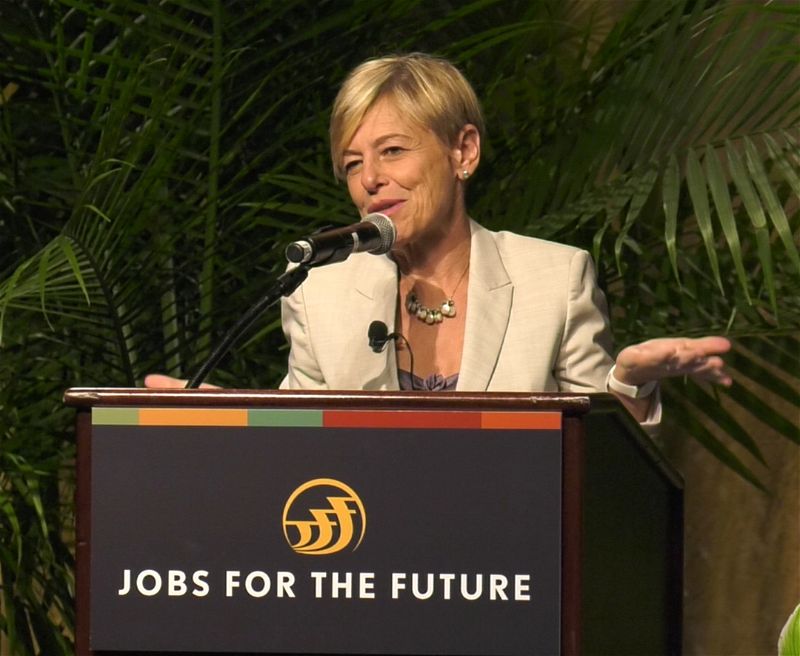
Our 40th Anniversary
May 7, 2018
At a Glance
JFF celebrated our 40th anniversary in 2023 with exciting new endeavors focused intently on the future. Join us as we build on our history of success to transform US workforce and education systems to help all Americans advance in our nation’s economy.
Watch: 40 Years Strong
JFF Cofounder Talks JFF’s History
She was a Yale graduate student with no idea what to do next. He was a renowned public opinion researcher mulling over a new venture.
Hilary Pennington found her answer just before graduation in 1983 when Arthur White, who cofounded the legendary market research firm Yankelovich, Skelly, and White, gave a speech on campus. His idea to solve a fast-growing problem in the US economy—how to help workers losing their jobs due to automation—was the inspiration she craved.
Months later, Pennington, 29, tracked down White, 60, for a one-on-one meeting, and together they created what would become Jobs for the Future.
“He took a chance on me,” JFF’s cofounder Pennington told staff during a visit to the Boston office in June. “And I took a chance on him.”
JFF was ahead of its time then and it’s ahead of its time now.
Originally called Jobs for Connecticut’s Future, the organization’s mission was groundbreaking for the time: 1) use the best available research to forecast what the jobs of the future would be; 2) determine what skills people would need to fill those jobs; and 3) reimagine the education and training system to prepare workers for that future.
Between 1984 and 1989, White and Pennington expanded their work into Arkansas, Colorado, Indiana, Mississippi, and Missouri.
Today, as JFF celebrates its 40th anniversary, our mission is arguably more important than ever, with technology and other global forces accelerating the pace of worker displacement and economic change. As the world prepares for the future of work, JFF is focused on transforming the workforce and education systems to create economic opportunity for all.
You’re really modernizing and reapplying those core founding ideas for a society that has still not figured out these problems and, if anything, has them in an even more serious way.
“JFF was ahead of its time then and it’s ahead of its time now,” Pennington, now executive vice president of the Ford Foundation, told JFF employees crowded into a conference room and watching online.
“You’re really modernizing and reapplying those core founding ideas for a society that has still not figured out these problems and, if anything, has them in an even more serious way.”
Just as she and White “took a chance” on each other, a young woman and a near-retirement-age man, JFF is urging the nation’s employers to consider hiring a broad range of nontraditional employees by tapping the talent of populations most frequently left behind in the economy.
“If you look at the jobs that are most likely to be lost, they are disproportionately occupied by women and people of color,” Pennington said. “This is an organization that has always been one that has stood for something, that has been scrappy and young, that has taken a bet on young people and given them a chance to lead with young ideas and bold ideas.”
It’s incredibly inspiring to see who JFF is today—the energy you have and the passion and creativity that you bring to this time of JFF’s work.
Five Fun Facts from JFF Cofounder Hilary Pennington

- JFF’s first office was a car. Fortunately, cofounder Arthur White had an early-model car phone, so he and Pennington could keep working as they drove from meeting to meeting around Connecticut. “We’d go around to companies, and Arthur was this amazing person who never took no for an answer. And we’d go into a meeting and pitch the idea for Jobs for the Future, and they said we were crazy. And he’d say to me, ‘That went well. Be sure to follow up.’”
- JFF has always prided itself on bipartisan appeal. Jobs for the Future started branching out from Connecticut with the “weirdest” group of governors—two Republicans and two Democrats, including Bill Clinton of Arkansas and John Ashcroft of Missouri. “We worked really, really hard to be an organization that would have solutions either way,” Pennington said.
- JFF’s first major grant was to build youth apprenticeship programs. Funding originally from the Pew Foundation grew into an area of major focus today with our Center for Apprenticeship and Work-Based Learning.
- JFF interviewed its first potential Massachusetts employees at a McDonald’s. Soon after, Pennington opened JFF’s first Boston-area office in Somerville. It was the day the stock market crashed in 1987.
- JFF has had three CEOs in its 40-year history—all women. Pennington was president and CEO for 22 years. The second president and CEO was Marlene Seltzer, who retired in 2015. Maria K. Flynn became our current president and CEO in 2016, following nearly 10 years in other leadership roles with JFF.
Some of the Successes from our 40 Years!

Impact Profile of Cierra Swopes: The Student Becomes the Teacher
Impact Profile of Cierra Swopes: The Student Becomes the Teacher For Cierra Swopes, attending an early college high school revealed paths she never would have considered. Now, she’s providing the same opportunity for today’s students.…

Impact Profile of Patrick Cofield: Never Too Old for Learning
Impact Profile of Patrick Cofield: Never Too Old for Learning Accelerate TEXAS programs integrate basic skills with career and technical pathways to help adult students acquire skills and certificates in high-demand occupations. Here is a…

Impact Profile of William Warren: Pursuing an Artistic Passion and Career through Accelerating Opportunity
Impact Profile of William Warren: Pursuing an Artistic Passion and Career through Accelerating Opportunity This Accelerating Opportunity profile showcases William Warren, who was able to channel his passion for art into a career by earning…

Impact Profile of Lacey Bowman: Accelerating to College and Career Success
Impact Profile of Lacey Bowman: Accelerating to College and Career Success This is Lacey Bowman’s success story of earning her GED and pursuing a career in welding with the help of the Accelerate TEXAS program.…

Impact Profile of Joel Perez: Manufacturing Pathway Leads to Brighter Future for Accelerating Opportunity
Impact Profile of Joel Perez: Manufacturing Pathway Leads to Brighter Future for Accelerating Opportunity Joel Perez struggled to provide both the financial and emotional support that his two children needed. After enrolling in an Accelerating…

Impact Profile of Doralee Ortez: Native-American Nurses "Break Through" Basic Ed Barrier
Impact Profile of Doralee Ortez: Native-American Nurses "Break Through" Basic Ed Barrier Doralee’s future was unclear after she dropped out of high school, but the nursing program at Northwest Indian College in Washington, a Breaking…
Watch co-founder Hilary Pennington speak at our 2016 national summit
More about our 40th anniversary

Horizons 2024 –The Power of Us
Horizons is where we find The Power of Us to collectively work towards our North Star. Horizons is where learners, workers, educators, employers, and leaders from across our ecosystem come together to drive equitable economic…
